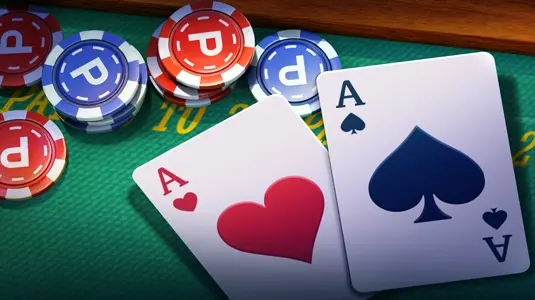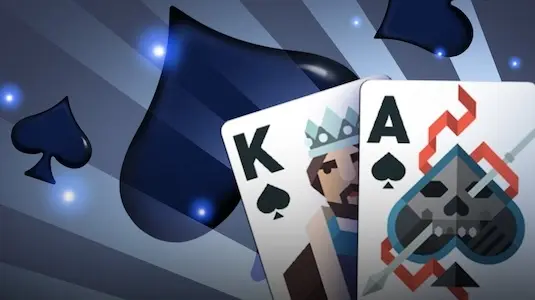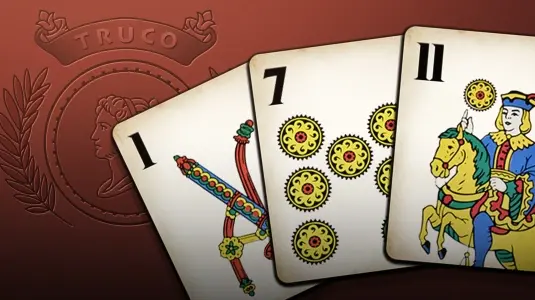 Gin Rummy
Gin RummyHead-to-head Gin Rummy. Draw, discard, form melds, and knock before your opponent outscores you.
Play Gin Rummy online with friends for free
Basic Tactics
Begin each hand by playing offensively--that is, trying to win the hand. If things don't go well, you must decide at some point whether to switch to a defensive strategy--either to minimize your losses by getting rid of high cards, or to attempt to block the opponent from getting the cards he or she needs until the deck is exhausted.
If you find you are winning too few hands, you're not playing offensively enough; while if you are losing too many hands by large scores because you're caught with a lot of points, you're not playing defensively enough.
When only one card will help, try to keep your hand intact for a couple of turns. When two cards can help you, go a bit longer; but soon, if there's no improvement, start discarding high cards (such as a pair of kings). If your hand can be improved in more ways, though, or if your unmelded total is low, you can afford to play on.
If you have an unmelded count of only 1, it's a good time to go for gin; if the opponent knocks, you will undercut him or her--the only risk is that the opponent will go gin first.
Discarding Tips
Try to discard cards that will give you the most offensive options, and that will help the opponent the least. Most players like to discard their high cards first, but this is not always the best strategy. If you know your opponent plays this way, for example, you can deliberately save high cards, and you'll have a fairly good chance that the opponent will discard one you need.
Except when you're trying to knock, you shouldn't pay much attention to the fact that one discard will reduce your point count more than another.
While low cards in your hand are valuable, they can also be good defensive discards, which usually don't help the opponent reduce his or her hand's point count much. If you give the opponent a third king, the opponent's point count is reduced by 20; if you give the opponent a third ace, his or her point count is only reduced 2 points.
If no cards of certain ranks or cards that fall within certain suit sequences do not appear for much of the hand, there's a good chance the opponent has them.
Runs ending with king or ace are less valuable than others, because they can only be added to at one end. With K Q J of a suit, only the 10 of that suit will extend the run, but with Q J 10 9, either the king or eight will work--twice as good a chance.
This also means that throwing an ace or king is less likely to give opponent a run than throwing a queen or two; and throwing a queen or two is safer than throwing a three, a jack, or anything in between.
Try to remember all the discards, so you don't end up trying for a meld that can't be made. Pay close attention to your opponent's discards, and think about what they reveal. When the opponent picks up your discard, try to determine whether it was to make a set or a sequence; subsequent discards will often make this clear.
Also take note of what cards the opponent fails to pick up. If you can deduce what the opponent has, you may be able to avoid discarding the card that will help the opponent until you knock.
Top Ranked Winners
Can I play online?
Yes. Install the Plato app on iOS, Android, or macOS to play the full catalog with friends or matchmade opponents. You can also play Ocho online in your web browser — no install needed.
Can I play with friends?
Yep. Tap Create Private Game, then share the invite link or invite from your contacts. When they tap Accept, they're seated at your table.
Is it free?
Yes — free to play and ad-free. If you buy something, it's for looks (themes, profile flair), not power.
Is it fair?
Shuffles, deals, dice, and timers run on Plato servers, not your device. Everyone plays by the same rules and no one can peek at hidden information.
Is it safe?
You can block and report from profiles or chat. Public spaces use filters and human review. Some rooms use Chat Pass to deter spam, and privacy controls let you limit who sees you online.
Live vs. turn-based: what’s the difference?
Both are turn-taking; the difference is the clock. Live uses short timers for quick back-and-forth. Turn-based gives you longer — often up to 24 hours per move in games like Chess — so you can play at your pace.











